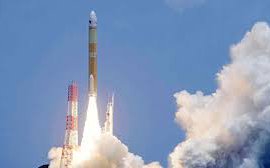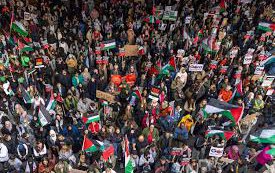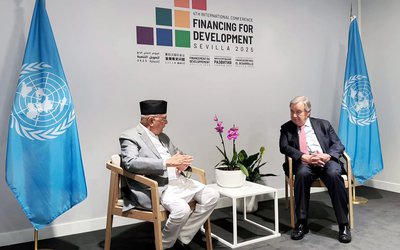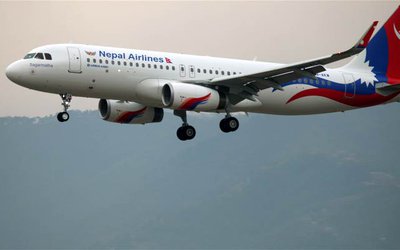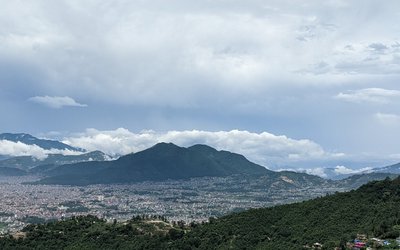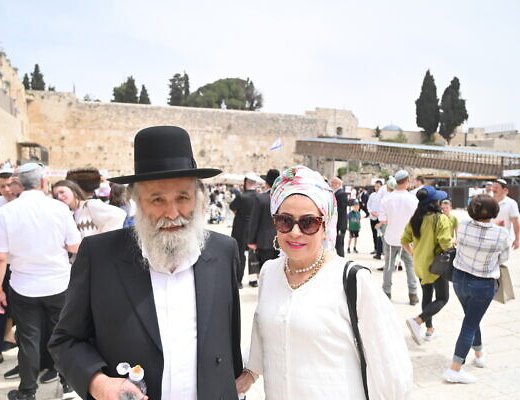
Israeli warplanes and artillery struck targets in Syria following rare rocket fire from the northeastern neighbor, as Jewish-Muslim tensions reached a peak Sunday at a volatile Jerusalem shrine with simultaneous religious rituals.
Thousands of worshipers from all three main Abrahamic religions converged on Jerusalem’s Old City on Sunday morning to celebrate their holidays during what the Israeli government has termed a “wave of terrorist attacks.”
A steady stream of Jews, the men wearing white prayer shawls around their shoulders, poured into the Old City under the gaze of hundreds of bulletproof vest-clad Border Police officers. The worshipers huddled near the Western Wall for Birkat Kohanim, the priestly blessing, of Passover.
Half a mile away, Muslims were entering the Al-Aqsa Mosque atop the Temple Mount, where several hundred worshipers had just agreed to leave after staying there overnight. The overnighters had holed up there following Saturday Ramadan prayers, which fell on Passover this year, in what many had feared could lead to a violent clash with police. On Sunday, several hundred Jewish visitors were allowed access to the Temple Mount. Their 30-minute, police-supervised tours, in groups of 20-30 pilgrims per tour, ended without incident.
Meanwhile, Christian tourists back from the Sunrise Service at the Garden Tomb flooded the Old City’s alleyways, affording a taste of summer, when, during calm years, European and American tourists arrive en masse during high season, to the delight of the local souvenir shop owners.
This year, the Old City’s monotheistic trifecta took place in the shadow of a string of deadly attacks in Israel. On Saturday, an Italian tourist died and several Israelis were wounded in what police said was a terrorist car-ramming attack in Tel Aviv. On Friday, two sisters on their way with their mother to the resort city of Tiberias were shot dead in a terrorist attack in the Jordan Valley; their mother is fighting for her life in the hospital. Terrorists in Lebanon, Syria and the Gaza Strip launched dozens of rockets into Israel in recent days.
These and other events have prompted police to augment their already-heavy presence in the Old City. Clusters of five to 10 police officers hung around many corners, some of them behind metal fences, their hands on assault rifles and their eyes warily scanning the pedestrian traffic.
None of it made a deep impression on Eliran Hardon, a 38-year-old man who last month relocated to Jerusalem from Petah Tikvah, and on Sunday attended the Birkat Kohanim for the first time to celebrate the move. “I feel elated. I know good things are about to happen to me and to the whole of Israel and I feel this much more strongly now,” said Hardon, who lives in Jerusalem’s French Hill neighborhood.
Eliran Hardon waits for the light rail after attending Birkat Kohanim in Jerusalem, Israel, on April 9, 2023. (Canaan Lidor)
According to police, some 10,000 people attended the Birkat Kohanim, a similar turnout to previous years. But Efrat Elias, a supervisor for the Western Wall Heritage Foundation, a government organization that manages the site, said attendance this year was lower. “There was a good number of people here, including many women, but overall it’s clear that the security situation has kept many away. Last year, you couldn’t move and this year you can negotiate your way forward even during the peak of the event,” she told The Times of Israel.
Edna Hananyah, who came for the Birkat Kohanim with her husband, Yitzhak, concurred sadly. “It’s unfortunate but the terrorists have kept many people away. Jews should be coming here no matter what.”
During the Birkat Kohanim, the women, in their separate section of the Western Wall area, turn away from the men during some parts of the prayer, to avoid seeing the Kohanim, members of what used to be the Jewish People’s priestly caste, who gave the prayer its name. In the men’s section, descendants of Kohanim bless the rest of the people, who raise their hands to receive the blessing.
An iconic moment of reconnection by thousands of people to customs predating the destruction of the Temple in Jerusalem, the Birkat Kohanim takes place twice a year, on Passover and Sukkot.
In recent years, a growing number of Jews have been combining the Birkat Kohanim with another custom with origins in the Temple: Performing a pilgrimage to see a great rabbi. Known as “kabalat pnei rabo,” Hebrew for “greeting one’s rabbi,” it was introduced following the Temple’s destruction as part of a vision “that sought to transfer the now-ruined place of sanctity, the Temple, onto the great sages, the great rabbis of Judaism,” said Zvi Mark, a scholar of Hasidic movements at Bar-Ilan University.
It’s part of the reason why Hardon, the recent arrival to Jerusalem, was moved by the presence of the Ashkenazi Chief Rabbi of Israel, David Lau, on a balcony overlooking the Western Wall during the Birkat Kohanim. “You feel part of something great, together with the greats,” Hardon said.
One observer of the custom of greeting one’s rabbi, 42-year-old Ohad David of Pisgat Ze’ev, skipped some of the Birkat Kohanim altogether to see Rabbi Mordechai Sheiberger, the leader of David’s Or HaGanuz Orthodox Jewish community. “The Birkat Kohanim is a mass event. It has its place. But when you go see a rabbi who’s great, you get much closer to sanctity,” said David after visiting with seven other followers at the rabbi’s home in the Jewish Quarter of Jerusalem.
David, a father of five, left his two oldest sons, who were supposed to accompany him to Jerusalem, back home because of the security situation.
“There’s no question of abandoning the custom because of a few terror attacks, but there’s no need to pretend the circumstances are ideal for bringing children to the Old City right now,” David, 42, said.
Thousands of Jewish worshippers gathered at the city's Western Wall, the holiest place where Jews can pray, for a mass priestly benediction prayer service for the Passover holiday. At the Al-Aqsa Mosque compound, a walled esplanade above the Western Wall, hundreds of Palestinians performed prayers as part of observances during the Muslim holy month of Ramadan.
Hundreds of Jews also visited the Al-Aqsa compound under heavy police guard Sunday, to whistles and religious chants from Palestinians protesting their presence.
Such tours by religious and nationalist Jews have increased in size and frequency over the years, and are viewed with suspicion by many Palestinians who fear that Israel plans one day to take over the site or partition it. Israeli officials say they have no intention of changing long-standing arrangements that allow Jews to visit, but not pray in the Muslim-administered site. However, the country is now governed by the most right-wing government in its history, with ultra-nationalists in senior positions.
Tensions have soared in the past week at the flashpoint shrine after an Israeli police raid on the mosque. On several occasions, Palestinians have barricaded themselves inside the Al-Aqsa Mosque with stones and firecrackers, demanding the right to pray there overnight, something Israel has in the past only allowed during the last 10 days of the Muslim holy month of Ramadan. Police removed them by force, detaining hundreds and leaving dozens injured.
The violence at the shrine triggered rocket fire by Palestinian militants from the Gaza Strip and southern Lebanon, starting Wednesday, and Israeli airstrikes targeted both areas.
In Lebanon, Hezbollah's media office announced that the militant group's chief, Hassan Nasrallah, received a delegation headed by Hamas leader Ismail Haniyeh on Sunday. The two discussed "the most important developments in occupied Palestine, the course of events at al-Aqsa Mosque, and the escalating resistance in the West Bank and Gaza, in addition to general political developments in the region, the readiness of the resistance axis and the cooperation of its parties," the statement said.
Haniyeh, who arrived in Lebanon last week shortly before rockets were launched at Israel from south Lebanon, had been scheduled to make a public appearance in Beirut on Friday. But it was canceled for security reasons following the exchange of strikes between Lebanon and Israel. No group has officially claimed responsibility for the rocket attacks, but Israel has accused Hamas of being behind them.
Late on Saturday and early Sunday, militants in Syria fired rockets in two salvos toward Israel and the Israeli-annexed Golan Heights. A Damascus-based Palestinian group loyal to the Syrian government claimed responsibility for the first round of rockets, saying it was retaliating for the Al-Aqsa raids.
In the first salvo, one rocket landed in a field in the Golan Heights. Fragments of another destroyed missile fell into Jordanian territory near the Syrian border, Jordan's military reported. In the second round, two of the rockets crossed the border into Israel, with one being intercepted and the second landing in an open area, the Israeli military said.
The Times of Israel
- Putin touts rebuilding in seized Ukrainian regions
- Jul 01, 2025
- Trump urges Israel, Hamas to reach ceasefire deal
- Jun 30, 2025
- Japan's final H2A rocket puts satellite into orbit
- Jun 29, 2025
- Rally in Israel calls for Gaza ceasefire
- Jun 29, 2025
- US could bomb Iran again if it continues high-level uranium enrichment: Trump
- Jun 28, 2025


